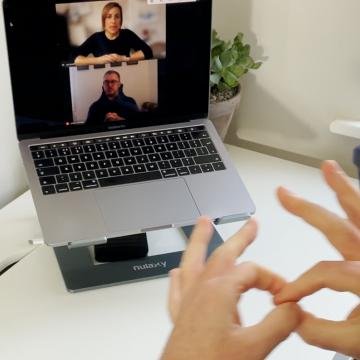Signalise Co-op is one of ten community businesses funded by the Power To Change Makers & Maintainers programme, which supports community businesses who are already on a journey of creating community tech – technology that can meet their specific needs, respects their autonomy and creates value that sticks to places.
Meet Signalise co-op
Signalise Co-op is a unique co-operative, owned by Deaf people and providing British Sign Language interpreting services to people living on Merseyside. It is the only service in the UK to have Deaf people as members and co-owners. Currently, Signalise has 80 Deaf user members and 92 worker members.
Signalise was established in 2019 by a group of experienced British Sign Language interpreters with a passion for improving access to interpreters in the UK.
The British Deaf Association says there are up to 87,000 Deaf people who use British Sign Language in the UK as their first or preferred language, but there are only 1,300 British Sign Language interpreters in the UK – and just 50 on Merseyside.
Signalise recognised that failures of the procurement model for interpreting services had led to a decline in quality and poor access for the Deaf community and interpreters. Agencies who are awarded contracts by government often have no knowledge or understanding of the Deaf community or its needs, cannot provide a service, and interpreters do not like to work for them.
By contrast, Signalise’s members have ownership of the co-operative, they engage with the running, they have voting rights, they create the system, they use the services and ultimately share in the benefits of the co-operative, whether this is more work or better access. Unlike any other provider, profits are reinvested in the development and support of members, which in turn results in higher standards and benefits the Deaf community.
How Signalise Co-op is creating and using community tech
Signalise Co-op’s mission as a platform cooperative is to create their own technology that works for the benefit of all users. Users book and provide interpreters using a digital platform.
The digital platform is co-designed by people with lived experience, which means that the team is aware of what the community needs, the problems they are aiming to solve, and are fully committed to bringing benefits to their community.
Signalise has created and uses three apps to deliver its services, alongside an off-the-shelf customer relationship management (CRM) system. The apps provide a booking platform, a video interpreting service and access to NHS statistics.
Signalise’s technology has so far enabled them to deliver a range of NHS and other interpreting services, which they hope to expand. The team knows that the better the technology, the more competitive their services will be – which, in turn, will enable them to thrive in the longer term and deliver continued community benefit.
The Makers & Maintainers programme will enable Signalise to make progress against a number of key priorities for developing their community tech. This includes investment in their back end systems and integration between systems and apps to improve user experience; and creating new community features, such as a chat function. They will use surveys, user testing sessions and meetings with members to validate assumptions, shape the design of the platform and create future iterations of features, thereby ensuring that their technology is fully accountable to the Deaf community living on Merseyside.
How community tech is strengthening communities
Signalise’s community tech creates significant value for Deaf people, while also promoting community cohesion and community wealth-building, and helping to address entrenched barriers to accessing health services that contribute to widening health inequalities.
The digital platform empowers Deaf people to shape and access interpreting services that meet their needs, while also offering interpreters better pay and exposure to more varied work and training, which both increases standards for the Deaf community and supports the development of a resilient local economy.
The platform supports community cohesion by making diversity visible – for example, Merseyside NHS staff can access online training, meaning they are better informed about equality and diversity of Deaf people and their communication needs.
And by providing local interpreters (in contrast to their global competitors), Signalise helps to build community wealth: more of the funding paid locally by the NHS is retained within the community for reinvestment, training or spent in the local economy.
By creating a system together, Signalise has made a system that everyone will want to use. A system that gives Deaf people more control and choice, a system interpreters will want to use, and one that services will want to buy.
Find out more about the programme
If you would like to find out more about community tech, or would like to receive news and updates, please join our mailing list.
Essays exploring how communities work with technology and innovation to shape better places.
Introduction: Creating Value that Sticks to Place
Realising the Power of Place-Based Community Innovation in the UK
How Can We Create Community Alternatives to Big Tech Infrastructures?
Participatory Community Technology
Interview with Wings, Ethical Delivery Coop
Gebiedonline: Community Tech in Practice
Interview with Community Care Connect, the Community-Powered Homecare Platform
